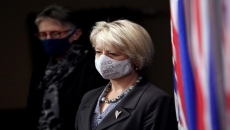OTTAWA - Friday is the deadline for employees in the core federal public service to declare their COVID-19 vaccination status, but unions say there are still many questions about how requests for accommodations will be handled.
The Treasury Board of Canada Secretariat says 240,000 employees have filed their attestations of their vaccine status to the government, out of approximately 268,000.
Though the total includes some recently retired employees and people on leave, that still leaves tens of thousands of workers who have yet to fill out their paperwork, said Chris Aylward, president of the Public Service Alliance of Canada.
He has urged all employees, regardless of their vaccine status, to get their forms in to their employer, but said there is a big hole in the policy when it comes to deciding if unvaccinated people should be accommodated under the Canadian Human Rights Act.
"That's something that we are obviously very, very concerned about if it is being left up to the individual managers, and certainly, that's the way it looks right now," Aylward said in an interview Thursday.
"Leaving it up to the individual managers to question the sincerity of employees beliefs, that's just opening the door to discrimination for us for some workers," he said.
The policy states that all employees must be fully vaccinated with two doses of a Health Canada approved vaccines in order to remain at work, even if they work from home.
Employees unable to be vaccinated for medical, religious or other reasons protected under the Canadian Human Rights Act can request accommodation.
By Nov. 15, unvaccinated employees who don't merit accommodation according to the government will be put on unpaid leave, and they government said previous those employees will not qualify for employment insurance benefits.
The same goes for employees unwilling to be vaccinated, or who don't declare their vaccine status.
Prime Minister Justin Trudeau has said exemptions will be difficult and onerous to obtain, and simply having a personal conviction that vaccines are "bad" will not be sufficient.
The Treasury Board Secretariat, which is responsible for the vaccine policy, did not immediately respond to a request for comment from The Canadian Press. The department's website states it's up to managers to decide if an employee's reasons for remaining unvaccinated are valid.
Managers can also look to internal subject matter experts for guidance.
Federal public service unions have come out in favour of vaccine mandates, but have expressed apprehension about how the government will handle requests for accommodation since the idea was first proposed and said they were not properly consulted before the policy was announced.
Professional Institute of the Public Service of Canada (PIPSC) still receives calls from members who are against the mandatory vaccination policy, and some who cannot be vaccinated, according to vice president Stéphane Aubry.
Unions will only file grievances once reasonable requests for accommodations are denied and employees are put on leave, which won't happen until Nov. 15, so they are not yet handling any specific cases.
The union recommends those get vaccinated if they can and request accommodation from their managers if they can't.
"It’s questionable," Aubry said. "It could be biased easily, based on how managers could be asked to view, interpret and make a decision that is not based on strong direction."
It's a tough situation for managers left to make those decisions as well, said Brian Dijkema, vice-president of external affairs at the faith-based think-tank Cardus.
"Typically, even the courts themselves have been pretty hesitant to decide what's religiously valid or invalid according to somebody's belief," Dijkema said.
Dijkema said it may a different situation in the long-term care sector, for example, where the safety risks are higher and unvaccinated employees pose a more immediate risk to health and safety.
But many government jobs can be done from home, he said, and taking such a hard stance against unvaccinated employees could backfire.
"There's actually quite a body of evidence that suggests that hard lines actually harden opposition and not only hesitancy, but perhaps anti-vaccine animus." he said.
"From a public health point of view and an employer point of view, I think there are probably better options for the federal government to take."






